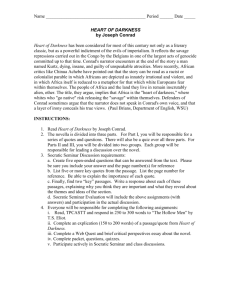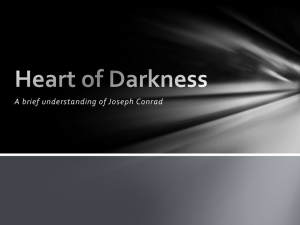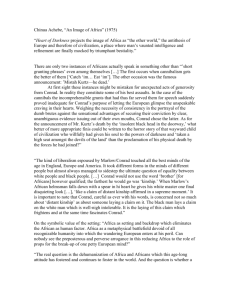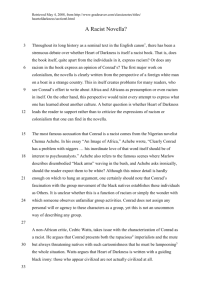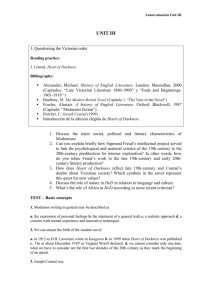summaries of the sections of Brantlinger's article
advertisement
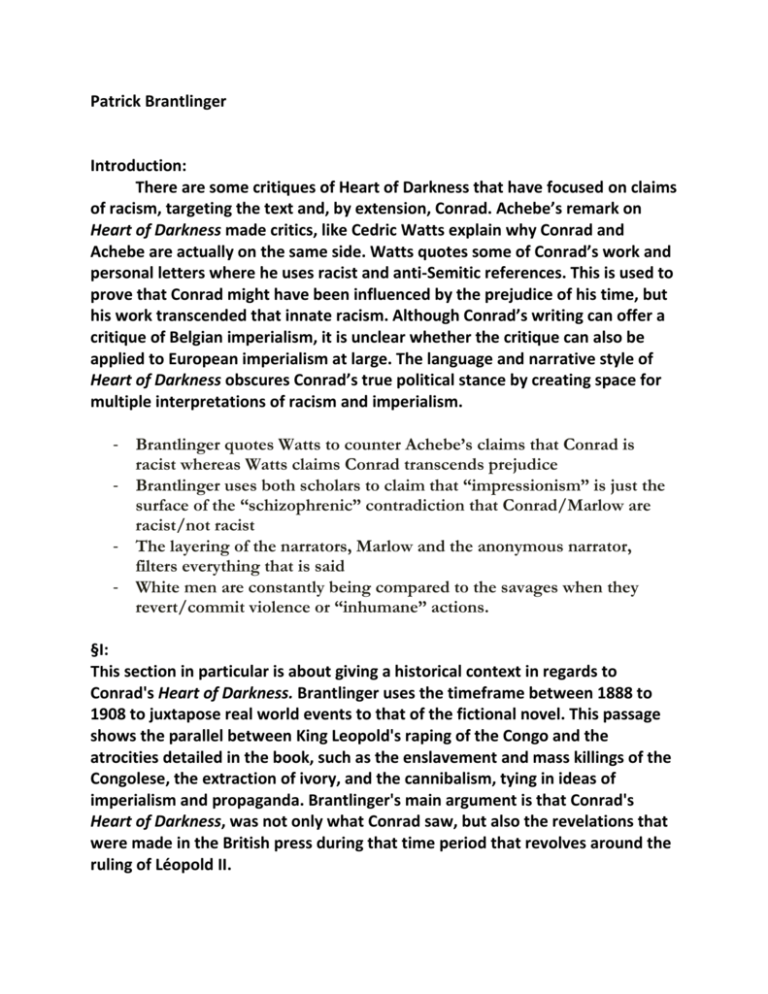
Patrick Brantlinger Introduction: There are some critiques of Heart of Darkness that have focused on claims of racism, targeting the text and, by extension, Conrad. Achebe’s remark on Heart of Darkness made critics, like Cedric Watts explain why Conrad and Achebe are actually on the same side. Watts quotes some of Conrad’s work and personal letters where he uses racist and anti-Semitic references. This is used to prove that Conrad might have been influenced by the prejudice of his time, but his work transcended that innate racism. Although Conrad’s writing can offer a critique of Belgian imperialism, it is unclear whether the critique can also be applied to European imperialism at large. The language and narrative style of Heart of Darkness obscures Conrad’s true political stance by creating space for multiple interpretations of racism and imperialism. - Brantlinger quotes Watts to counter Achebe’s claims that Conrad is racist whereas Watts claims Conrad transcends prejudice - Brantlinger uses both scholars to claim that “impressionism” is just the surface of the “schizophrenic” contradiction that Conrad/Marlow are racist/not racist - The layering of the narrators, Marlow and the anonymous narrator, filters everything that is said - White men are constantly being compared to the savages when they revert/commit violence or “inhumane” actions. §I: This section in particular is about giving a historical context in regards to Conrad's Heart of Darkness. Brantlinger uses the timeframe between 1888 to 1908 to juxtapose real world events to that of the fictional novel. This passage shows the parallel between King Leopold's raping of the Congo and the atrocities detailed in the book, such as the enslavement and mass killings of the Congolese, the extraction of ivory, and the cannibalism, tying in ideas of imperialism and propaganda. Brantlinger's main argument is that Conrad's Heart of Darkness, was not only what Conrad saw, but also the revelations that were made in the British press during that time period that revolves around the ruling of Léopold II. Conrad is more concerned with the “lying propaganda” of imperialist ideology than the bloody oppression happening in the Congo. Conrad did not witness all of the atrocities, and actually read second-hand accounts on most of them. Conrad is more concerned with destroying the “high sounding rhetoric” and “sordid ambitions” of Imperialism. The evidence shows a Conrad, who still sees the Congolese as something less than human, such as his parallels between the Congolese and horses, or his line from “The Inheritors” about the Dimensionists treating “us”/ Europeans as “we ourselves treat inferior races,” indicating a focus more on the actions of European imperialists than on the effects of these actions on the colonized people. §II: Patrick Brantlinger argues that Conrad’s Heart of Darkness is an attack on imperialism. Conrad portrays the negative features of imperialism by showing European motives to be, “…no better than African fetishism and savagery.” (311) While there are critics who condemn Conrad’s writing as anti-imperialistic with unconscious employment of racist terminology, Brantlinger comes to his defense and argues that Conrad uses racist terminology in a very calculated way in order to show, “…a complex web of contradictory political and moral values.” (312) PB doesn’t argue that HoD is an attack on imperialism—he says he understands why some people think it is. Point about “African fetishism and savagery” is lost in summary. And PB has a lot more to say about this “complex web of contradictory political and moral values” than is indicated here. §III: Section 3 acts as a volta. Conrad uses a genre which is racist, and that leads to it being read as a racist text. Difficult to judge, because it’s hard to locate meaning because concrete meaning has been skewed by the abstract language of the novel. In looking at contradictions within the text, you must note that it is structured to criticize the genre and conventions it is already a part of. But it is intentionally structured, as a means of us (the readers) seeing these contradictions, and so forth deconstructing the underlying forms of imperialism. --What do you mean by when you write, “Section 3 acts as a volta”? - “A genre which is racist”? What genre? The Gothic Romance? The colonialist adventure story? And how is this genre racist? Specificity! -What do you mean by “abstract language”? “Conrad’s impressionism” may fit, better here. - “contradictions”? schizophrenic language? “myriad of contradictions”\ - “It is intentionally structured as a means for the readers to see these contradictions, and so deconstruct for themselves the underlying forms of imperialism.” - §IV: In Section IV, Brantlinger lays out his arguments that Heart of Darkness points out the ease with which white colonists “went native” (providing several examples from real life and the novel itself), thus revealing that, in Conrad/Marlow’s view, whites are not by nature superior to the African natives they are in the process of brutally exploiting. As Brantlinger succinctly states, “the African wilderness serves as a mirror, in whose ‘darkness’ Conrad/Marlow sees a death-pale self-image.” This can be taken to mean that Conrad/Marlow recognizes that the darker aspects of human nature are not inherent to the “savage” African natives, but rather, through the extreme lawlessness of the Congo are given the chance to corrupt an otherwise “civilized” human (such as Kurtz) in ways which are not possible in the comparatively rigid, organized, and advanced world of Europe. By pointing out the relative ease with which such supposedly enlightened men are seduced by the anarchic freedoms of the unexplored regions of Africa, Brantlinger supports his main assertion that while grounded in a racist world, Heart of Darkness serves to highlight the injustices that lie beneath the belief, intrinsic to white society of the time, that by nature whites are more civilized and cultured than their African counterparts, and “the horror” felt upon realizing that this belief is very, very far from the truth. -We thought the summary of section 4 wasn’t taking note of what P.B. is saying about Conrad. -By focusing on Kurtz, P.B. is trying to get the readers of his essay to take note of the contradictions taking place within the novel. P.B. thinks those contradictions are put there purposefully by Conrad, and that the readers of HOD need to take note of them. “In suggesting his affinity to Kurtz, [Conrad] suggests the moral bankruptcy of his own literary project” (322). P.B. says: “I do not believe the real strength of Heart of Darkness lies in what it says about atrocities in King Leopold’s Congo” (322). P.B. wants his readers to note the contradictory nature of the text as a means of seeing Conrad’s: “Social criticism, [the novella’s] anti-imperialist message is undercut by both its racism and by its impressionism” (322).

